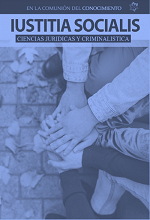Civil marriage between persons of the same sex and its impact on the legal framework of Ecuador
DOI:
https://doi.org/10.35381/racji.v5i3.1088Keywords:
Marriage, family law, judicial sentence.Abstract
The main objective of the investigation is to demonstrate that civil marriage between people of the same sex, applied through ruling No. 10-18-CN / 19 of the Constitutional Court, violates the Constitutional Legal framework of Ecuador, is an authoritarian procedure of Exceeding the functions of the Constitutional Court, ordering compliance with a non-existent law in the legal system, assuming competencies and powers that are not provided by the Constitution, entail a lack of legal effectiveness without rejecting that the LGBTI community is subject to demand rights and contract obligations. Under the quantitative paradigmatic modality. It relies on the analytical-synthetic method, since it offered the possibility of analyzing the information obtained from a sample of 316 lawyers, to which a questionnaire consisting of 5 questions was applied. It concludes Sentence N ° 10-18-CN / 19 should be void and the constitutional reform procedure followed as the only way established in the Magna Carta.
Downloads
References
Asamblea Nacional Constituyente de la República del Ecuador, (2008). Constitución de la República del Ecuador. [ Montecristi. Registro Oficial 449 de 20-oct-2008. Recuperado de https://n9.cl/sia
Asamblea Nacional del Ecuador. (2016). Ley Orgánica de Gestión de la Identidad y Datos Civiles. [Organic Law on Identity Management and Civil Data]. Registro oficial Suplemento 684 de 04-feb-2016.
Barahona-Nejer, A. (2015). Igualdad, familia y matrimonio en la constitución ecuatoriana 2008 [Equality, family and marriage in the Ecuadorian Constitution of 2008]. Revista de Derecho, 70-94. doi:10.32719/26312484
Barrientos, J. (2016). Situación social y legal de gays, lesbianas y personas transgénero y la discriminación contra estas poblaciones en América Latina. [The social and legal status of gay men, lesbians and transgender persons, and discrimination against these populations in Latin America]. Sexualidad, Salud y Soicedad, 22, 331-354. https://doi.org/10.1590/1984-6487.sess.2016.22.15.a
Congreso Nacional del Ecuador. (1970). Código Civil. Título preliminar. [Civil Code] Quito, Pichincha, Ecuador: Registro Oficial No. 104.
Corte Constitucional del Ecuador. (12 de junio de 2019). Causa No. 0010-18-CN [Cause No. 0010-18-CN] Recuperado de: https://n9.cl/lahet. Consulta de constitucionalidad de norma. Quito, Pichincha, Ecuador: Corte Constitucional del Ecuador.
Corte Constitucional del Ecuador. (12 de junio de 2019). Sentencia No. 11-18-CN-19
[Judgment No. 11-18-CN-19] Recuperado de: https://n9.cl/5mxz. Matrimonio igualitario. Quito, Pichincha, Ecuador: Corte Constitucional del Ecuador. Dau-Lin, H. (1932). Die Verfassungswandlung [The constitutional change]. Berlín: Walter de Gruyter.
Marshall, P. (2018). Matrimonio entre personas del mismo sexo: una aproximación desde la política del reconocimiento. [Marriage between people of the same sex: an approach from the politics of recognition Casamento entre pessoas do mesmo sexo: uma abordagem desde a política de reconhecimento]. Polis, 17(49)201-230. Repuerado de https://n9.cl/l3qf1
Mendieta-Ferán, C., Erazo-Álvarez, J., Narváez-Zurita, C., & Vázquez-Calle, J. (2020). Mutación constitucional: matrimonio igualitario a partir de la interpretación de la corte constitucional del Ecuador. [Constitutional mutation: equal marriage based on the interpretation of the Ecuadorian constitutional court] Iustitia Socialis 188-215. doi:http://dx.doi.org/10.35381/racji.v5i9.731
Molina-Ricaurte, C., y Carrillo-Cruz, Y. (2018). El matrimonio de parejas del mismo sexo y la Corte Constitucional de Colombia. [The marriage of same-sex couples and the Constitutional Court in Colombia]. Revista de Derecho. 31(1), 79-103. http://dx.doi.org/10.4067/S0718-09502018000100079
Published
How to Cite
Issue
Section
License
CC BY-NC-SA : Esta licencia permite a los reutilizadores distribuir, remezclar, adaptar y construir sobre el material en cualquier medio o formato solo con fines no comerciales, y solo siempre y cuando se dé la atribución al creador. Si remezcla, adapta o construye sobre el material, debe licenciar el material modificado bajo términos idénticos.
OAI-PMH URL: https://fundacionkoinonia.com.ve/ojs/index.php/Iustitia_Socialis/oai










